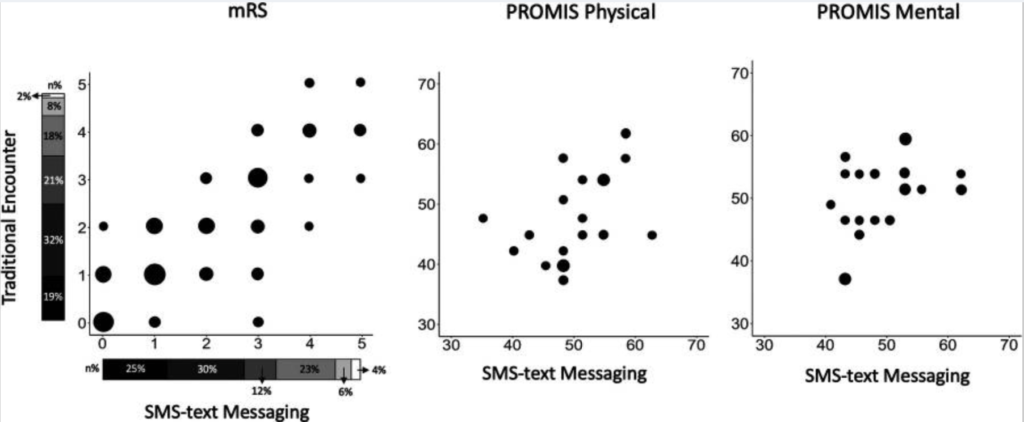Congratulations to LTNr members for their new publication in Frontiers in Digital Health entitled, “SMS-text messaging for collecting outcome measures after acute stroke”, which examines a promising method (SMS-text) for gathering outcomes after acute stroke! SMS-text can be used to evaluate the efficacy of acute stroke treatments at scale and help to keep providers in closer touch with patients after acute stroke discharge.
Authors: Julie A. DiCarlo, Kimberly S. Erler, Marina Petrilli, Kristi Emerson, Perman Gochyyev, Lee H. Schwamm, and David J. Lin
Abstract:
Introduction: Traditional methods for obtaining outcomes for patients after acute stroke are resource-intensive. This study aimed to examine the feasibility, reliability, cost, and acceptability of collecting outcomes after acute stroke with a short message service (SMS)-text messaging program.
Methods: Patients were enrolled in an SMS-text messaging program at acute stroke hospitalization discharge. Participants were prompted to complete assessments including the modified Rankin scale (mRS) and Patient-Reported Outcomes Measurement (PROM) Information System Global-10 at 30, 60, and 90 days post-discharge via SMS-text. Agreement and cost of SMS-text data collection were compared to those obtained from traditional follow-up methods (via phone or in the clinic). Participant satisfaction was surveyed upon program conclusion.
Results:Of the 350 patients who agreed to receive SMS texts, 40.5% responded to one or more assessments. Assessment responders were more likely to have English listed as their preferred language (p = 0.009), have a shorter length of hospital stay (p = 0.01), lower NIH stroke scale upon admission (p < 0.001), and be discharged home (p < 0.001) as compared to non-responders. Weighted Cohen’s kappa revealed that the agreement between SMS texting and traditional methods was almost perfect for dichotomized (good vs. poor) (κ = 0.8) and ordinal levels of the mRS score (κ = 0.8). Polychoric correlations revealed a significant association for PROM scores ( ρ = 0.4, p < 0.01 and ρ = 0.4, p < 0.01). A cost equation showed that gathering outcomes via SMS texting would be less costly than phone follow-up for cohorts with more than 181 patients. Nearly all participants (91%) found the program acceptable and not burdensome (94%), and most (53%) felt it was helpful. Post-stroke outcome data collection via SMS texting is feasible, reliable, low-cost, and acceptable. Reliability was higher for functional outcomes as compared to PROMs.
Conclusions:While further validation is required, our findings suggest that SMS texting is a feasible method for gathering outcomes after stroke at scale to evaluate the efficacy of acute stroke treatments.

